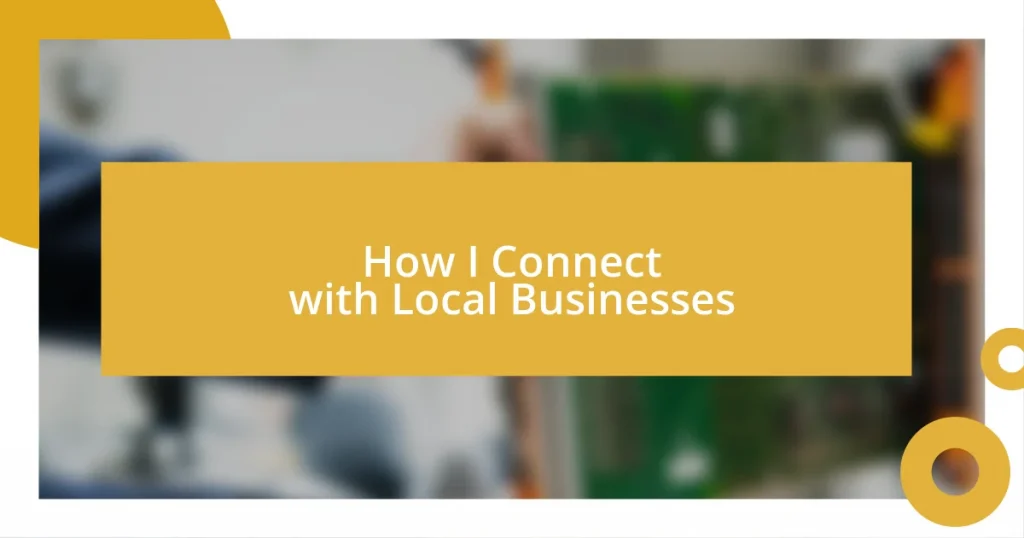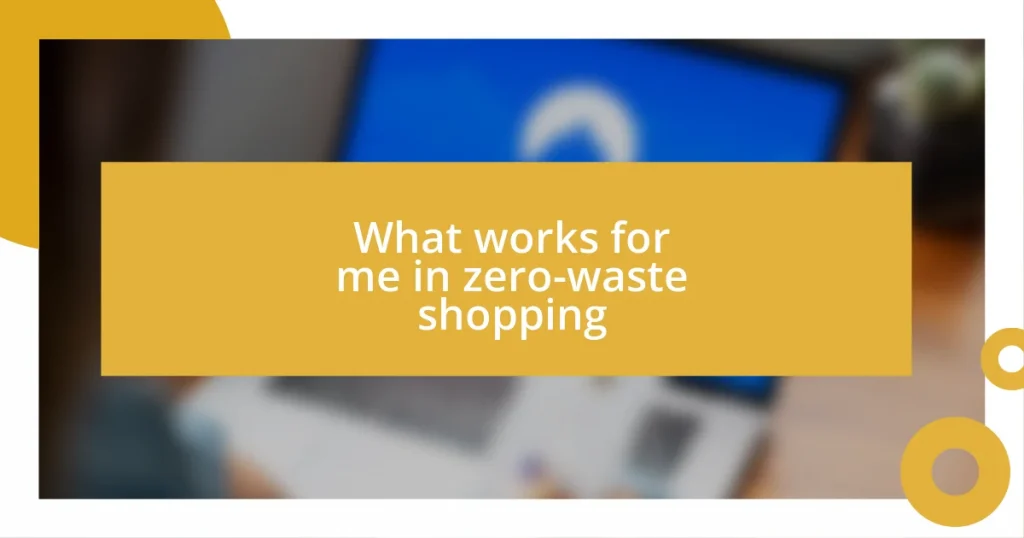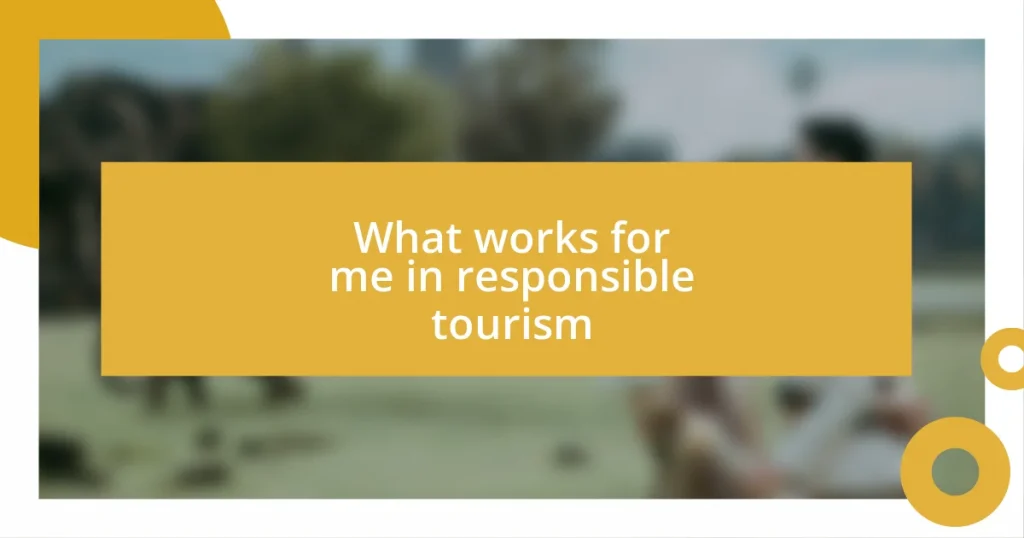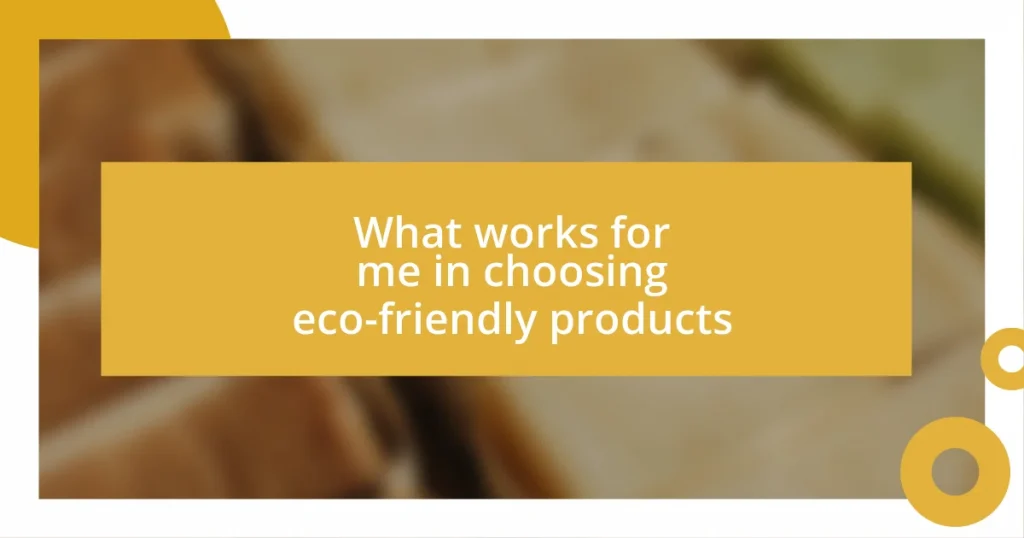Key takeaways:
- Understanding local business needs involves listening to their unique challenges, fostering community support, and recognizing the importance of connection.
- Building a strong community network through local events, online groups, and collaboration enhances trust and promotes mutual growth among businesses.
- Establishing trust through transparency, consistent communication, and meaningful interactions nurtures relationships with local businesses, ultimately leading to shared success.

Understanding Local Business Needs
Understanding local business needs isn’t just about numbers and profit margins; it’s about the stories behind them. I remember chatting with a local café owner, who shared how the pandemic nearly drove her to close her doors. She spoke about the importance of community support and how local customers rallied to keep her business afloat. Isn’t it inspiring how businesses thrive through connection?
When I think about local businesses, I often ask myself: What keeps them awake at night? For some, it’s increasing visibility; for others, it’s mastering the digital landscape. A neighbor of mine, who runs a small bakery, often struggles with managing her social media presence. This drives home the point—we must truly listen to their unique challenges to find ways to help.
Every local business has specific needs that reflect their market and community. Not long ago, I participated in a workshop that connected entrepreneurs with marketing experts. It was eye-opening to witness firsthand the “aha” moments as they realized new avenues for growth. I felt a deep connection to their ambitions, reminding me that understanding their needs is not just beneficial but necessary for mutual progress.

Building a Community Network
Building a strong community network is essential for local businesses, as it fosters trust and collaboration. Recently, I joined a local business meetup, and it was amazing to see how sharing resources and experiences created a sense of belonging. A florist, for example, spoke about collaborating with a nearby event venue for better visibility, and it sparked a lively discussion on how partnerships can lead to mutual success.
Here are some effective ways to build a community network:
- Attend Local Events: Engaging with local fairs or markets allows you to meet business owners and understand their passions.
- Join Online Groups: Finding community-focused Facebook or LinkedIn groups helps connect with entrepreneurs who share your goals.
- Host Networking Sessions: Create opportunities for local businesses to come together and share insights in a relaxed environment.
- Leverage Shared Experiences: Sharing personal stories and challenges often opens the door for deeper connections.
- Support Each Other: Building a network means actively promoting and referring local businesses to foster growth.

Leveraging Social Media Connections
Leveraging social media connections is one of the most effective strategies I’ve found to connect with local businesses. I often see how platforms like Instagram and Facebook can amplify a small business’s reach. For instance, I once stumbled upon a quaint bookstore on Instagram. Their posts regularly featured beautiful book displays and customer testimonials, creating a warm sense of community that drew me in. I felt inspired to visit and support their passion project.
When I reflect on my engagement with local businesses on social media, I notice that authenticity really resonates with customers. One unforgettable moment was when a family-run ice cream shop posted a behind-the-scenes video of their ice cream-making process. Not only did it showcase their artistry, but it also highlighted their commitment to quality ingredients. This transparency builds trust and creates that emotional connection essential for community support.
To put the impact of social media connections in perspective, I’ve created a comparison of traditional outreach methods versus leveraging social media for local businesses. It’s fascinating to see how engagement shifts with the right online approach.
| Method | Impact |
|---|---|
| Traditional Outreach (Flyers, Events) | Limited Reach, Higher Costs |
| Social Media Engagement | Wider Audience, Cost-Effective |

Hosting Collaborative Events
Collaborative events can be a game-changer in building relationships among local businesses. I remember when my favorite café teamed up with a nearby bakery for a “Taste of the Neighborhood” event. They combined their strengths, drew in new customers, and created an atmosphere that felt genuinely festive. This kind of collaboration showcases how local businesses can amplify each other’s reach through joint efforts.
Organizing events can also allow businesses to showcase not only their products but their stories. One time, I joined a local crafting workshop where several artisans shared their creations. I found it fascinating how each participant’s unique background added depth to their craft. It struck me that sharing personal stories in these settings deepens connections and fosters an understanding of each other’s values and creativity.
It’s essential to think about the potential impact of inviting the community to these collaborative events. Will they feel included? When businesses unite to create engaging experiences, they’re not just promoting themselves—they’re building a sense of belonging. Watching attendees connect over shared interests during an event leaves you with warmth and a sense of purpose that lingers long after the last guest has left. How can you create that sense of joy in your own community?

Utilizing Local Online Platforms
Utilizing local online platforms can really enhance the way I connect with businesses in my community. For example, I often turn to neighborhood-specific apps and websites, like Nextdoor, to discover local offerings and engage directly. Just the other day, I found a hidden gem—a tiny craft shop—having a webinar on DIY home decor. I couldn’t resist joining, and not only did I learn new skills, but I also connected with other locals who shared my interests.
Something I’ve noticed is that local directories, like Yelp and Google My Business, provide an excellent opportunity for businesses to share genuine reviews and photos. I remember writing a review for a local vegan restaurant that made my heart sing with every bite. The owners reached out to thank me, and we ended up chatting about their journey into the culinary world. It made me realize that these platforms aren’t just for ratings; they’re about building relationships and fostering conversations that matter.
When I explore new local businesses online, I always keep an eye out for promotions or special events advertised on their pages. Recently, I learned about a local winery’s virtual tasting event through their Facebook page. Not only did I savor delicious wines from the comfort of my home, but I also got to engage with the winemaker live. It really struck me how these online interactions enhance our local community’s spirit—how can I take that feeling of connection and share it with others?

Establishing Trust with Local Businesses
Trust forms the bedrock of any relationship with local businesses. I recall visiting a local bookstore where the owner took the time to chat with me about the books I loved. That genuine interest made me feel valued as a customer, and I instantly trusted the recommendations she offered. Trust isn’t built overnight; it’s nurtured through those small, meaningful interactions that leave us feeling understood and appreciated.
One of the best ways I’ve found to establish trust is by being transparent in our dealings. A few months ago, I collaborated on a project with a nearby bakery. They were upfront about their sourcing practices and ingredient quality, which reassured me as we promoted their offerings together. This honesty not only enhanced our partnership but also made customers feel confident about supporting local businesses that prioritize integrity.
Moreover, I’ve learned that consistent communication plays a vital role in building trust over time. I often participate in local business newsletters that share updates and behind-the-scenes stories. When I read about the challenges and triumphs of these businesses, it deepened my respect for their dedication. How often do we pause to consider the journey behind the products we love? Understanding these narratives not only personalizes the business but also fosters a sense of community and trust that can stand the test of time.

Measuring Success of Connections
Measuring success in connecting with local businesses is often more than just tracking numbers—it’s about the depth of relationships formed. I remember attending a local farmers’ market where I struck up a conversation with one of the vendors. By the end of the day, I had their contact information and a commitment to return the following week. That personal interaction felt like a small victory, as it opened the door for ongoing communication and potential collaborations in the future.
One tangible way I gauge the impact of these connections is by observing engagement on social media. I once shared a local event on my Instagram stories and was pleasantly surprised by the influx of messages from friends wanting to join me. It made me realize how one simple post can spark a community-wide interest. Are we paying enough attention to the feedback and interactions that follow our business engagements? These little insights have shifted how I assess success—not just through likes or shares, but by the real conversations that arise as a result.
I also find it essential to evaluate the loyalty developed through these connections. Recently, I visited a local café multiple times because of the warm atmosphere and familiar faces. After chatting with the barista, I learned they offer discounts for regulars. This kind of reciprocity not only reinforces my commitment to supporting them but also illustrates how businesses can track success through customer loyalty. Reflecting on such experiences makes me wonder: what valuable connections might we be overlooking if we only focus on the obvious metrics?















